Suspected Gulnara Karimova letter smuggled to BBC
- Published
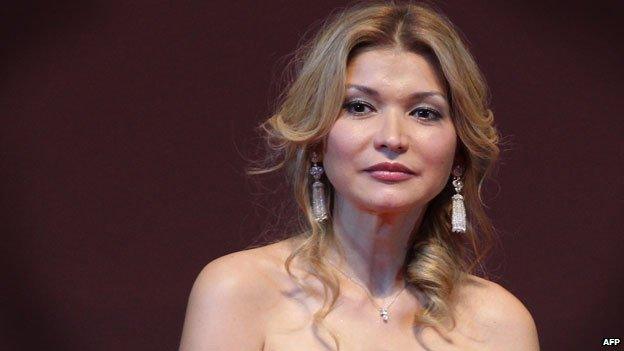
Gulnara Karimova, the daughter of Uzbekistan's president, used to be one of the most powerful people in Central Asia. Last year she fell from grace - but remained active online until five weeks ago. Since then, she has been silent.
The long rambling letter in my inbox is littered with signs of distress. "I am under severe psychological pressure, I have been beaten, you can count bruises on my arms," reads one line.
Another paragraph describes a life under house arrest, daily threats and constant observation from cameras and police.
The letter was sent from Uzbekistan, one of the world's most isolated and repressive states, as an attachment from an anonymous person who described himself as someone "trying to restore justice". The sender said the letter had been written in the last few days and smuggled out to him, but refused to give details.
It is unsigned, but the level of detail and insight, the convoluted style and the neat Russian handwriting suggests that the author is no dissident, but Gulnara Karimova, once talked about as a possible successor to her father, Uzbek President Islam Karimov.
"How naive I was to think that the rule of law exists in the country," reads one line of the letter.
An analysis comparing part of the letter with a sample of handwriting known to be Karimova's concluded there was a high probability (75%) that the letter was indeed written by her.
"Working without originals, it is almost impossible to achieve a 100% match with handwriting, but there is a very high probability that the two notes were written by the same person," says Inessa Goldberg, an Israel-based expert who specialises in Cyrillic handwriting.
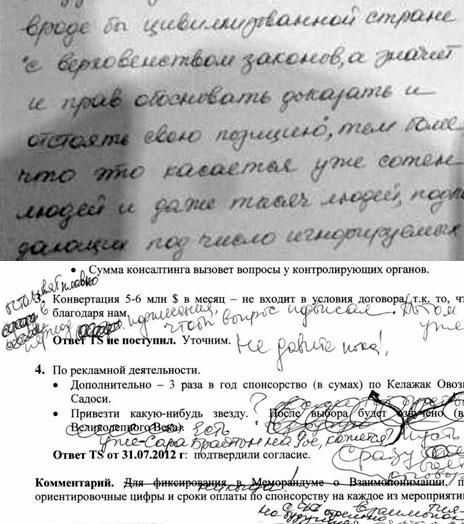
An excerpt from the letter, and (below) a sample of Karimova's handwriting
The letter sheds new light on the spectacular downfall of one of Uzbekistan's most influential figures, and her battle against key members of the regime, which has unfolded live for the world to see on Twitter.
For the last 14 months, Karimova, once described in leaked US diplomatic cables as a "robber baron" and "the most hated person" in Uzbekistan, has tweeted about her falling-out with her strongman father, and its consequences - the closure of her businesses and TV stations, the shutting down of her charity and arrests of her supporters.
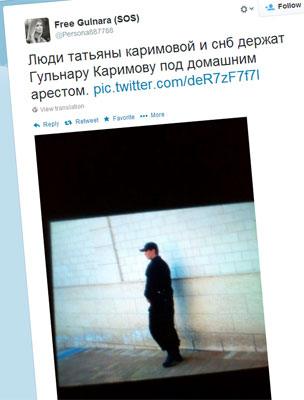
Karimova's supporters have posted photos of men apparently guarding a wall around her home
As Karimova's empire crumbled she became openly critical of key figures in the regime, and especially her father's top security man Rustam Innoyatov, whom she accused of trying to seize power.
From time to time she and I exchanged tweets. In a country where internet and media are censored, her Twitter feed provided an unprecedented insight into events that could previously only have been guessed at. But on 16 February she went quiet. Her Twitter account has since been suspended.
Karimova's last tweet was sent out just a day before Uzbek police stormed a luxury apartment in the capital, Tashkent, arresting a group of people that no law enforcement officer in Uzbekistan would previously have dared to touch.
The letter provides a first-hand account of the police operation and its aftermath. "What makes it all worse, is that it is impossible to live like a human when you are watched by cameras, when there are armed men everywhere and when you are depressed because of what you have seen: special forces jumping on to the roof, your things in a mess, broken windows and doors and worst of all: a blindfolded person who is being dragged along the floor," it says.
The "blindfolded person" is likely to have been Rustam Madumarov, Karimova's business partner and, reportedly, her boyfriend, who was arrested that night along with two of her closest associates. The same day the three were charged with embezzlement, tax fraud, illegal possession of foreign currency and money laundering.
In fragmented, erratic, at times difficult-to-understand language, Karimova describes how in the last few weeks "hundreds, possibly already thousands" of her supporters and former employees have been intimidated, arrested and threatened.
She says she has been isolated from them for being a disseminator of inconvenient "unnecessary truth". There is no television, no internet, no telephone in her house, she says, and she is worried about her daughter who is ill.
A source in Tashkent who is close to Karimova confirmed that she is currently under house arrest and that her 16-year-old daughter, Iman, is being held with her. The man, who didn't want to be identified, also said that US embassy staff have visited Iman, who is an American citizen. (Her father, Karimova's ex-husband Mansur Maqsudi, is an American citizen of Afghan origin.)
The US embassy in Tashkent refused to confirm the visit, saying in a written reply "as a matter of policy it was unable to comment on this specific inquiry". The statement added: "As a general policy the Department of State and our diplomatic missions abroad have no higher priority than assuring the welfare and safety of American citizens abroad."
Throughout the letter, Karimova makes allegations against her mother, her sister and some of her father's closest allies. She accuses them of racketeering, blackmail and torture.
"The reason for this Pinochet-style persecution is that I dared to speak up about things that millions are quiet about," she writes.
But for many, Karimova's attacks about her family and others will strike a hypocritical note. Gulnara, as most Uzbeks call her, has long been the glamorous face of the regime she now criticises. She ran a business empire, became the country's best-known pop star (under her stage name, Googoosha) and its foremost patron of fashion, art and design, created a perfume line, became the country's chief philanthropist, and served as its ambassador to the United Nations in Geneva.
Googoosha in the video for her single Round Run
Over the years I have interviewed a number of Uzbeks who have lost livelihoods to rackets operating under her name.
In 2012, a group of Swedish journalists uncovered evidence which led them to conclude that a Swedish-Finnish telecom company, TeliaSonera, had paid a $300m bribe in 2008 to enter Uzbekistan's lucrative mobile-phone market. The money was traced to an offshore company registered in Gibraltar and owned by 25-year-old Gayane Avakyan, who was one of the two female associates detained along with Karimova's boyfriend and fellow pop-star Rustam Madumarov on 17 February.
It has since become the biggest corruption case in Sweden's history, and on Monday Gulnara Karimova became an official suspect.
The investigation now involves 10 other European countries and the US. Two weeks ago, Swiss authorities announced they had also launched a money-laundering investigation into Karimova.
Gulnara has always denied any involvement in TeliaSonera, and the company itself denies any wrongdoing. In her letter, she once again insists the campaign against her was headed by her father's security chief, Innoyatov.
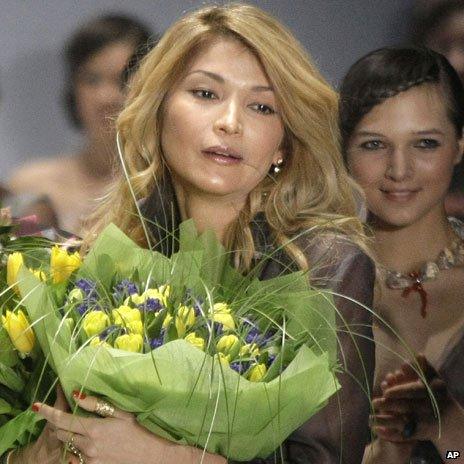
Karimova had a career as a fashion designer, among other things
"She paints herself as a victim, and her father as someone who has been manipulated," says Daniil Kislov, editor of Central Asia's leading Ferghana.ru website.
Kislov believes no-one but Karimov himself could have given the order to put his daughter under a house arrest or detain her closest friends. He says that the Uzbek strongman is punishing his daughter for the excesses of her lifestyle.
"The last 15 years have shown that Karimov couldn't care less about the international criticism of human rights in Uzbekistan, about torture in prisons, forced sterilisations in government hospitals, child labour in cotton fields," says Daniil Kislov.
What Karimov does care about, Kislov argues, is the damage Gulnara's reputation as a robber baron has done to Uzbekistan's ability to attract foreign investment, which for a while she appeared to monopolise. The arrests, Kislov suggested, were Karimov's way of telling his unruly daughter and the world that in Uzbekistan, he is the one in charge.
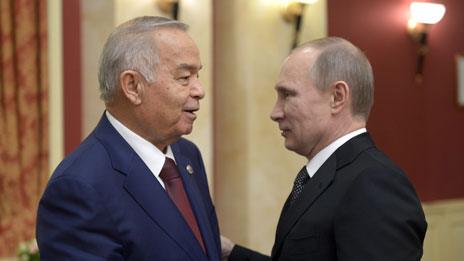
Islam Karimov and Vladimir Putin in Sochi
Despite a decade of rumours that Karimov suffers from a terminal illness, the 76-year-old looked alert and energetic when he attended the Winter Olympic opening ceremonies in Sochi in February. There are no signs that he wants to relinquish power.
But is the decision to lock Gulnara up also a sign of Karimov's weakness? It certainly suggests he is worried about the damage that his outspoken and well-informed daughter could cause.
And despite the fact that Gulnara's internet has been turned off, she is still managing to get her voice heard. Since sending her message to me, she has leaked another to Uzbek media in which she asks her father to let her leave the country for medical treatment.
"I never thought this could happen in a civilised, developing nation that Uzbekistan portrays itself as," she says in her letter to me.
"But a closer look showed me all the ugliness of what goes on here, and listening to people whom I would argue with before, I realise that all of it has been happening for a long time."
Though few Uzbeks will believe in Karimova's transformation into a defender of their rights, this message will resonate with many.
Follow @BBCNewsMagazine, external on Twitter and on Facebook, external